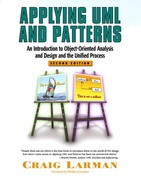29.6. Classes that Benefit from Statechart Diagrams
In addition to statechart diagrams for use cases or the overall system, they may be created for virtually any type or class.
State-Independent and State-Dependent Objects
If an object always responds the same way to an event, then it is considered state-independent (or modeless) with respect to that event. For example, if an object receives a message, and the responding method always does the same thing—the method will typically have no conditional logic. The object is state-independent with respect to that message. If, for all events of interest, an object always reacts the same way, it is a state-independent object. By contrast, state-dependent objects react differently to events depending on their state.
|
Create statecharts for state-dependent objects with complex behavior. |
In general, business information systems have a minority of interesting state-dependent classes. By contrast, process control and telecommunication domains often have many state-dependent objects.
Common State-dependent Classes
Following is a list of common objects which are usually state-dependent, and for which it may be useful to create a statechart diagram:
Use cases
Stateful sessions— These are server-side software objects representing ongoing sessions or conversations with a client; for example, EJB stateful session objects.
Another very common example is server-side handling of web client application and presentation flow logic; for example, a Java technology servlet helper or “controller” that remembers the state of the session with a Web client, and controls the transitions to new web pages, or the modified display of the current web page, based upon the state of the session or conversation.
A stateful session can usually be viewed as a software class representing a use case. Recall that one of the GRASP Controller pattern variants is a use case controller, which is a use case stateful session object.
Systems— This is a class representing the overall application or system.
The “POS system.”
Windows
The Edit-Paste action is only valid if there is something in the “clipboard” to paste.
Controllers— These are GRASP controller objects.
The Register class, which handles the enterItem and endSale system events.
Transactions— These are ways a transaction (a sale, order, payment) reacts to an event is often dependent on its current state within its overall lifecycle.
If a Sale received a makeLineItem message after the endSale event, it should either raise an error condition or be ignored.
Devices
TV, microwave oven: they react differently to a particular event depending upon their current state.
Role Mutators— These are classes that change their role.
A Person changing roles from being a civilian to a veteran.
